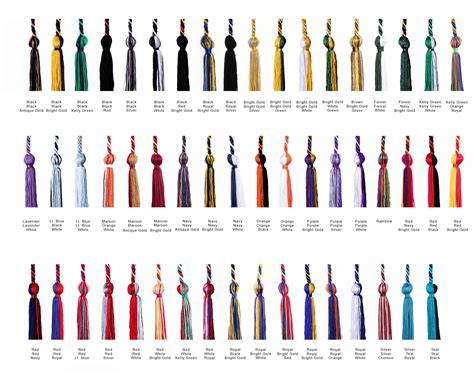Graduation cords are a common sight at graduation ceremonies, but what do they actually signify? Cords are typically awarded to students who have excelled in a particular area of study or who have participated in specific activities or organizations.

Academic Honors Cords
The most common type of graduation cord is the academic honors cord. These cords are awarded to students who have achieved a certain GPA or who have been inducted into an honors society. The specific requirements for receiving an academic honors cord vary from school to school, but generally, students must have a GPA of 3.5 or higher to be eligible.
Some of the most common academic honors cords include:
- Gold cords: Awarded to students with a GPA of 4.0 or higher
- Silver cords: Awarded to students with a GPA of 3.8 or higher
- Bronze cords: Awarded to students with a GPA of 3.5 or higher
Activity and Organization Cords
In addition to academic honors cords, many schools also award cords to students who have participated in specific activities or organizations. These cords can recognize involvement in everything from sports and clubs to student government and community service.
Some of the most common activity and organization cords include:
- Athletic cords: Awarded to students who have participated in varsity sports
- Club cords: Awarded to students who have been active in clubs and organizations
- Student government cords: Awarded to students who have served in student government
- Community service cords: Awarded to students who have volunteered their time to help others
Other Types of Graduation Cords
In addition to academic honors cords and activity and organization cords, there are also a number of other types of graduation cords that can be awarded. These cords can recognize everything from military service to religious affiliation.
Some of the most common other types of graduation cords include:
- Military cords: Awarded to students who have served in the military
- Religious cords: Awarded to students who are members of a particular religious organization
- Cultural cords: Awarded to students who are members of a particular cultural group
- Diversity cords: Awarded to students who have promoted diversity and inclusion on campus
How to Get Graduation Cords
The requirements for receiving graduation cords vary from school to school. However, generally, students must meet certain criteria in order to be eligible. These criteria may include:
- Maintaining a certain GPA
- Participating in a certain number of activities or organizations
- Completing a certain number of hours of community service
If you are interested in receiving graduation cords, be sure to check with your school’s registrar or academic advisor to find out the specific requirements.
Conclusion
Graduation cords are a great way to recognize students for their achievements and contributions. They can also help students to stand out from the crowd and to make a statement about their values and beliefs. If you are eligible to receive graduation cords, be sure to take advantage of the opportunity to do so.
Additional Information
Here are some additional tips and tricks for getting graduation cords:
- Start early. The sooner you start working towards your goals, the more likely you are to achieve them.
- Get involved. Get involved in activities and organizations that you are passionate about. This will not only help you to meet new people and make friends, but it will also give you the opportunity to earn graduation cords.
- Volunteer your time. Volunteering is a great way to give back to your community and to make a difference in the world. It can also help you to earn graduation cords.
- Be a leader. If you are a leader in your school or community, you are more likely to be recognized for your achievements. This can help you to earn graduation cords.
- Don’t be afraid to ask for help. If you are struggling to meet the requirements for graduation cords, don’t be afraid to ask for help from your teachers, advisors, or peers.
